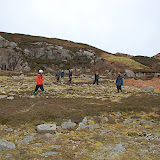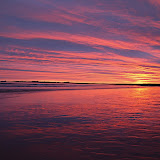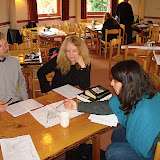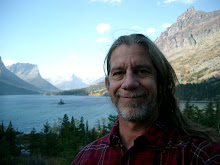Our, the EVT participants, sweat lodge experience had a sputtering start, but it ended up in the right space.
A
sweat lodge is an important aspect of many native cultures along North America, Siberia and North Europe whose religious beliefs depend on the shaman. I wanted to emphasize that though many attribute this ritual to North American Indians, it seems very likely that the ritual was brought with those hardy ancestors who came to North America via the Bearing Straight thousands of years ago and that the American Indians are connected to this ritual through these ancestors. It is a place of ritual purification and mystical insight through a vision quest, where the shaman performs prayers and songs in a sauna-like environment (the word 'sauna' is itself of Finnish origin and goes back to the shamanic heritage of Siberia). Anthropologists and psychoanalysts have observed and studied the fact that modern science-fiction very often reflects ancient epic structures (see Bibliography).
The EVT sweat lodge was to take place on Saturday night, but the weather was looking rather ominous and the decision was made to move it to Sunday. Well, the weather wasn't that much better on Sunday, snowing in the morning, raining thru the day, and very windy. But, we pulled it together and we all had a wonderful experience. With lodges there are a variety of traditions that can be followed, American Indian,
Picts,
Celts, Norwegian, etc. The tradition used by Craig is Celt base, I believe, but that is hard to pin down, because Craig's sweat lodge is very organic, very much like his garden, things come from variety of influences most of the time. Craig dedicated himself to be the Firekeeper (very important person in the lodge, keeps the fire going and stones hot), Gabriel led three (East, South, & West) of the rounds (prayer sessions in side the lodge), I was fortunate enough to lead the forth round (North, Earth, Wisdom, in some American Indian traditions the Wisdom of the Great White Buffalo is brought in to the lodge), and Andrew lead the fifth (free form). The women were allowed to have the first two rounds, then the men were integrated into the lodge for rounds 3, 4, & 5. For most of the participants this would be their first experience with sweat lodges, for most it will not be their last. The sharing that takes place in the lodge is very, very, very deep, this is brought on by the intense heat that is in the lodge due to the heated rocks. A round would last about 30-40 minutes, depending on the number in that round and length of the sharings. After each round we would exit the lodge steaming in the cold night, which was always welcomed, in side the lodge you must stay focused on your breathing or you will be overwhelmed with fear of dieing because of the intense heat. FYI, no one died, but there was never any expectation that this would occur, we take great care of one another.
I have had my eyes on a space behind my house for a couple of years thinking that might be a good place for a sweat lodge, now I am inspired to make this a reality, if not there somewhere in my future.
I will get some pics of the lodge tomorrow before we tear it down, but here is a picture of the sunrise on Sunday.










